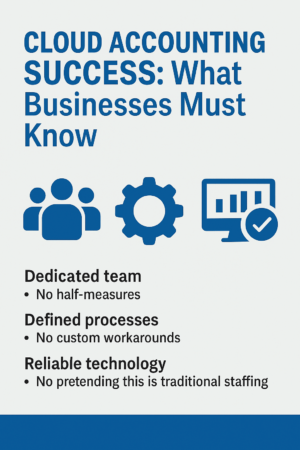Keys to Success with Cloud Accounting – Part 2: Requirements for Success and How to Select a Partner

What Cloud Accounting Success Means
In today’s fast-paced business world, achieving cloud accounting success is no longer just about using tools like QuickBooks Online, Bill.com, or Xero. It’s about creating a seamless system of people, processes, and technology that work together to deliver accurate, efficient, and scalable financial results.
Many firms promote cloud-based bookkeeping services. But not all understand how to build a system that leads to long-term cloud accounting success. Just signing up with a firm that uses cloud-based tools does not automatically improve outcomes. The real value lies in implementation, workflow structure, and how responsibilities are shared between the firm and the client.
Why Alignment Between Firm and Client Matters
Successful cloud accounting needs more than automation. It requires alignment.
A high-functioning relationship depends on both parties. The firm must provide expert staff, consistent delivery, and documented processes. At the same time, the client must engage in real time and work within the defined systems.
For example, if your provider uses a document management tool or a cloud-based bill pay system, your team must be willing to use those platforms. Collaboration is key to performance.
What the Best Firms Get Right
Top-performing cloud accounting firms share a few things in common:
- Documented onboarding
- Standardized workflows
- A team-based delivery model
- Built-in quality checks
They don’t just “do the books.” They deliver a complete financial operations system that scales with your business, keeps you audit-ready, and provides strategic visibility.
What to Avoid When Choosing a Provider
Unfortunately, some firms fall short. They operate without process, they rely on one overworked bookkeeper, and have no checks or backup support.
These gaps can lead to:
- Inconsistent reporting
- Late month-end closes
- Missed tax and audit deadlines
The right partner makes all the difference.
Ask the Right Questions Upfront
Before signing up, make sure the firm’s model matches your business operations. Ask:
- Can your team support their communication style?
- Do your deadlines match their reporting cadence?
- Are you willing to adapt internal processes for a better result?
These questions help avoid misalignment and ensure smoother collaboration.
Final Thoughts: Your Path to Cloud Accounting Success
To set your business up for cloud accounting success, you need more than tools—you need the right team and the right systems. Choose a partner who delivers more than reconciliations. Choose one who helps you scale, stay compliant, and make informed decisions.
Download our guide to learn how to evaluate cloud accounting providers and avoid common mistakes.